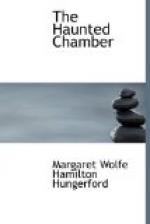He dashes into this like one possessed; but, finding himself in the light of the hanging lamp, collects himself by a violent effort, and looks around.
Yes, all is still. No living form but his is near. The corridor, as he glances affrightedly up and down, is empty. He can see nothing but his own shadow, at sight of which he starts and turns pale and shudders.
The next moment he recovers himself, and, muttering an anathema upon his cowardice, he moves noiselessly toward his room and the brandy-bottle that has been his constant companion of late.
Yet, here in his own room, he can not rest. The hours go by with laggard steps. Midnight has struck, and still he paces his floor from wall to wall, half-maddened by his thoughts. Not that he relents. No feelings of repentance stir him, there is only a nervous dread of the hour when it will be necessary to produce the dead body, if only to prove his claim to the title so dearly and so infamously purchased.
Is he indeed dead—gone past recall? Is this house, this place, the old title, the chance of winning the woman he would have, all his own? Is his hated rival—hateful to him only because of his fair face and genial manners and lovable disposition, and the esteem with which he filled the hearts of all who knew him—actually swept out of his path?
Again the lurking morbid longing to view the body with his own eyes, the longing that had been his some hours ago when listening at the fatal door, seizes hold of him, and grows in intensity with every passing moment.
At last it conquers him. Lighting a candle, he opens his door and peers out. No one is astir. In all probability every one is abed, and now sleeping the sleep of the just—all except him. Will there ever be any rest or dreamless sleep for him again?
He goes softly down-stairs, and makes his way to the lower door. Meeting no one, he ascends the stairs like one only half conscious, until he finds himself again before the door of the haunted chamber.
Then he wakes into sudden life. An awful terror takes possession of him. He struggles with himself, and presently so far succeeds in regaining some degree of composure that he can lean against the wall and wipe his forehead, and vow to himself that he will never descend until he has accomplished the object of his visit. But the result of this terrible fight with fear and conscience shows itself in the increasing pallor of his brow and the cold perspiration that stands thick upon his forehead.
Nerving himself for a final effort, he lays his hand upon the door and pushes it open. This he does with bowed head and eyes averted, afraid to look upon his terrible work. A silence, more horrible to his guilty conscience than the most appalling noises, follows this act; and, again the nameless terror seizing him, he shudders and draws back, until, finding the wall behind him, he leans against it gladly, as if for support.




